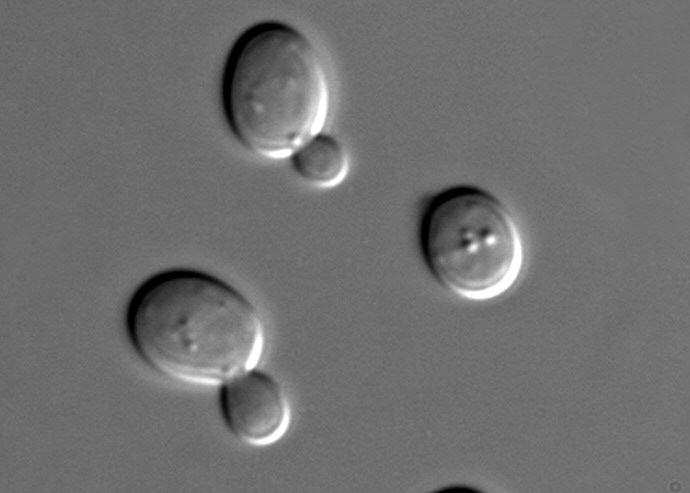Oorzaak veroudering gist onthuld met nieuwe techniek

Wetenschappers van de Rijksuniversiteit Groningen zijn een stap verder in het ontrafelen van het verouderingsproces in cellen. Zij ontwierpen een uniek experiment waarmee moleculaire processen in een verouderende gistcel gevolgd konden worden. Zo ontdekten zij dat overproductie van eiwitten die nodig zijn voor eiwitproductie, mogelijk aan de basis liggen van verouderingsprocessen die uiteindelijk de gistcel doden. De resultaten zijn gepubliceerd in het online tijdschrift eLife.
Bakkersgist is een veelgebruikt modelorganisme voor het bestuderen van veroudering. Een ‘moedercel’ kan ongeveer twintig dochters produceren in een dag of vier, voordat de cel sterft. Maar omdat in een kweekfles met gist moeders en dochters altijd door elkaar zitten, is het bijna onmogelijk om het verouderingsproces in detail te volgen. Een interdisciplinair team van de RUG heeft een experiment ontworpen om dit probleem aan te pakken. Dit team werd geleid door prof. Matthias Heinemann van de onderzoeksgroep Molecular Systems Biology en dr. Liesbeth Veenhoff van het instituut voor verouderingsonderzoek ERIBA.
IJzeren bolletjes
Zij koppelden ijzeren bolletjes aan gistcellen, die ze vervolgens lieten groeien op een roestvrijstalen oppervlak in kolommen, omgeven door een sterke magneet. De dochtercellen die afsplitsen van hun moeder, krijgen geen bolletjes mee en worden weggespoeld met de kweekvloeistof die door de kolom stroomt. Door op verschillende tijden monsters te nemen van de gistcellen in de kolommen waren de onderzoekers in staat de verouderingsprocessen in de tijd te volgen.
Transcripten
‘We hebben in onze monsters gekeken naar een groot aantal verschillende eiwitten en naar transcripten’, vertelt Heinemann. De transcripten zijn kopieën van genen die in het DNA gecodeerd zijn. Transcripten vormen de ‘mal’ voor de productie van eiwitten. Er bestaat doorgaans een verband tussen de aantallen transcripten van een gen en de hoeveelheid eiwit die hiervan wordt geproduceerd.
Ribosomale eiwitten
Heinemann: ‘Wat wij zagen was dat tijdens de veroudering dit verband verdween voor een specifieke groep eiwitten.’ Al vanaf het begin van hun leven produceerden de gistcellen meer zogeheten ribosomale eiwitten dan je zou verwachten op basis van de transcripten. Deze ribosomale eiwitten zijn de bouwstenen voor de eiwitfabrieken van de cel. Veenhoff: ‘Dat maakt deze eiwitten tot een interessant doelwit voor een aanpak van veroudering.’
Overproductie eiwitten
Overproductie van eiwitten kan slecht zijn voor cellen. ‘Het doet de celgrootte toenemen, en dat is een van de kenmerken van veroudering in gist’, legt Heinemann uit. In grotere cellen kunnen voedingsstoffen minder gemakkelijk doordringen, wat de stofwisseling verstoort.
Basale oorzaak
‘Omdat wij gegevens hebben over de dynamiek van het proces, kunnen we laten zien dat de overproductie van eiwitten voorafgaat aan veranderingen als de toename in celgrootte. We zien deze overproductie al in heel jonge cellen, wat er op wijst dat dit een basale oorzaak is van veroudering.’
Groeiprogramma
Maar waarom gebeurt dit dan? ‘Ons idee is dat een verhoogde productie van ribosomale eiwitten nuttig is voor jonge cellen’, legt Veenhoff uit. ‘Het stelt hen in staat om snel door te groeien tot volwassenheid. Maar dit groeiprogramma blijft doorgaan en krijgt dan uiteindelijk een negatieve rol.’ Het is interessant te zien dat bepaalde interventies die de levensduur in sommige organismen verlengen, zoals een beperking van de voedselopname, vermoedelijk ook de productie van eiwitten verlagen.
Niet eenvoudig
De experimenten in de kolommen waren overigens niet eenvoudig. Naast de inspanning die het kostte om vier dagen lang een continu experiment uit te voeren waarbij 24 uur per dag monsters werden genomen, was ook de analyse van de resultaten ingewikkeld. ‘Niet alle dochtercellen werden weggespoeld’, vertelt Heinemann. En sommige moedercellen gingen al snel dood. ‘Wiskundigen uit ons team hebben een manier gevonden om daarvoor te corrigeren.’
Dynamische kijk
De experimenten leverden ook een enorm grote hoeveelheid gegevens op. ‘Dat is typisch voor moderne biologie’, aldus Heinemann. Het kostte zeven mensjaren om alle gegevens te produceren en te analyseren. Maar het resultaat is er dan ook naar: een dynamische kijk op de moleculaire basis van veroudering.
Meer informatie
-
Referentie: Georges E Janssens, Anne C Meinema, Javier González, Justina C Wolters, Alexander Schmidt, Victor Guryev, Rainer Bischoff, Ernst C Wit, Liesbeth M Veenhoff, Matthias Heinemann : Protein biogenesis machinery is a driver of replicative aging in yeast .
-
First published ‘As accepted’ on 30 September. Official publication date 27 November 2015. DOI 10.7554/eLife.08527
-
Contact: prof.dr. Matthias Heinemann , Biology Biomolecular Systems , Groningen Biomolecular Sciences and Biotechnology Institute (GBB) of dr. Liesbeth Veenhoff, European Research Institute for the Biology of Ageing (ERIBA).
Meer nieuws
-
17 februari 2026
De lange zoektocht naar nieuwe fysica
-
10 februari 2026
Waarom slechts een klein aantal planeten geschikt is voor leven
